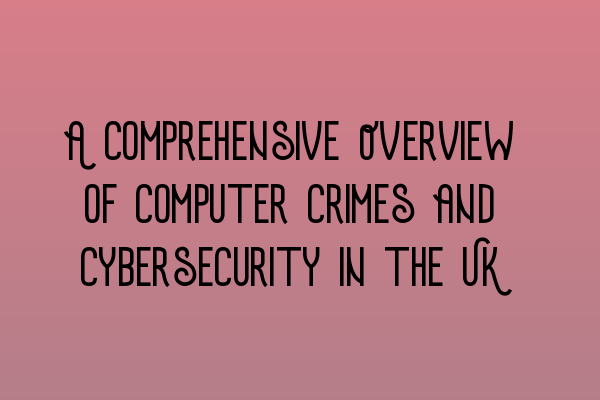A Comprehensive Overview of Computer Crimes and Cybersecurity in the UK
In today’s digital age, computer crimes and cybersecurity have become major concerns for individuals, businesses, and governments alike. The rapid advancement of technology has opened up new avenues for criminal activity and created a pressing need for robust cybersecurity measures.
The Impact of Computer Crimes
Computer crimes encompass a wide range of illegal activities that exploit computer systems and networks. These crimes can have severe consequences, including financial loss, damage to reputation, and breach of privacy. Common computer crimes include:
- Phishing: the fraudulent attempt to obtain sensitive information, such as passwords and credit card details, by disguising as a trustworthy entity.
- Malware attacks: the deployment of malicious software, such as viruses, worms, and ransomware, to disrupt or gain unauthorized access to computer systems.
- Identity theft: the misuse of someone’s personal information to commit fraud or other criminal activities.
- Hacking: unauthorized access to computer systems or networks with the intent to steal information, cause damage, or disrupt operations.
As computer crimes continue to evolve and become more sophisticated, cybersecurity measures must adapt to counter these threats effectively.
The Importance of Cybersecurity
Cybersecurity refers to the measures and practices adopted to protect computer systems and networks from unauthorized access, damage, or disruption. It encompasses various components, including:
- Firewalls: software or hardware devices that monitor and filter network traffic to prevent unauthorized access.
- Encryption: the process of converting data into a code to prevent unauthorized access during transmission or storage.
- Multi-factor authentication: an authentication method that requires two or more credentials, such as a password and a unique code sent to a mobile device.
- Regular software updates: installing the latest patches and updates to address security vulnerabilities.
Organizations and individuals must prioritize cybersecurity to safeguard sensitive information and prevent cybercrime. Failure to implement adequate measures can result in significant financial and reputational damage.
The Legal Framework for Computer Crimes in the UK
The UK has robust legislation in place to address computer crimes and ensure cybercriminals are held accountable. The Computer Misuse Act 1990 is the primary legislation governing computer-related offenses in the UK. It criminalizes various activities, including:
- Unauthorized access to computer systems or networks.
- Unauthorized modification of computer material.
- Unauthorized intent to commit further offenses.
The Act also establishes penalties for these offenses, including fines and imprisonment.
The Role of Solicitors in Cybercrime Cases
Solicitors specializing in criminal law and practice play a crucial role in cybercrime cases. They provide legal representation and advice to individuals and organizations involved in computer crimes, both as victims and suspects. A solicitor can help:
- Guide clients through the legal process.
- Ensure clients’ rights are protected.
- Advise on defenses and legal strategies.
- Prepare and present arguments in court.
If you require legal assistance or advice regarding computer crimes or other criminal matters, please contact SQE Criminal Law & Practice Law UK for expert guidance.
Conclusion
Computer crimes pose a significant threat to individuals and organizations in the UK. To mitigate these risks, robust cybersecurity measures must be implemented, and cybercriminals must be held accountable under the law. It is crucial to seek the expertise of a knowledgeable solicitor in cybercrime cases to ensure your rights are protected and to navigate the complex legal landscape.
For more information on related topics, please check out our articles:
- SQE 1 Practice Mocks FLK1 FLK2
- SQE 2 Preparation Courses
- SQE 1 Preparation Courses
- SRA SQE Exam Dates
